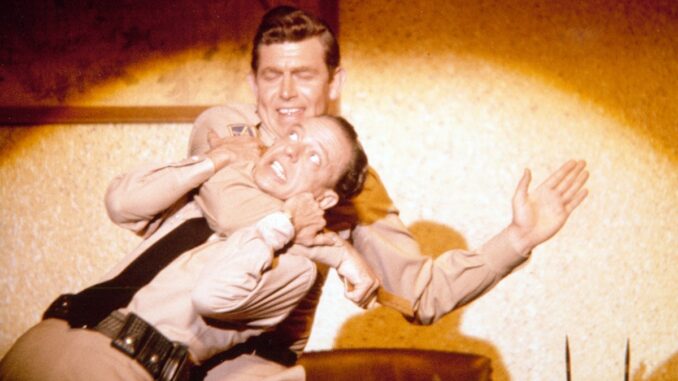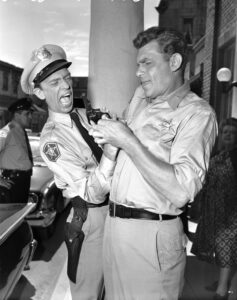
Introduction: A Star Born from Darkness
We know Don Knotts as the bumbling, lovable Deputy Barney Fife from The Andy Griffith Show. His exaggerated facial expressions, frantic energy, and comedic timing made him a fan favorite. But few know that behind that iconic grin was a man shaped by deep trauma — a childhood that bordered on the unthinkable.
This is not just a story about fame. It’s about how pain, when channeled, can fuel genius. Let’s uncover the dark truth about Don Knotts’ early life — and how he transformed personal terror into timeless laughter.
Don Knotts: America’s Comedic Treasure with a Haunting Past
Don Knotts didn’t just make America laugh. He redefined what a sidekick could be on television. But while viewers saw Barney Fife, a nervous, whistle-blowing deputy, they never saw the broken boy who once feared for his life at home.
The Early Years: Born Into Struggle
A Childhood Marked by Poverty
Don Knotts was born on July 21, 1924, in Morgantown, West Virginia. His family struggled with poverty during the Great Depression — and emotional instability made things worse.
His Father’s Mental Health Crisis
Knotts’ father, William Jesse Knotts, suffered from schizophrenia and severe depression. He had been institutionalized before Don was even born. According to several sources, including Knotts’ own family, his father was deeply disturbed — often threatening and volatile.
Terrifying Threats: A Father Who Threatened His Son’s Life
Regular Death Threats From His Father
In one of the darkest admissions ever revealed about the comedian’s life, it’s known that Don’s father frequently threatened to kill him. The threats weren’t vague or subtle. They were blunt, terrifying, and scarring for a young boy.
The Family Walked on Eggshells
Don’s home was a place of constant fear. His father would fly into violent rages, making life a daily survival mission. These weren’t empty threats. His father’s erratic behavior kept the entire family on edge — particularly young Don, the youngest of four boys.

The Escape: Losing His Father Young
A Traumatic Relief
When Don was just 13, his father passed away. While any death in a family is tragic, this one came with mixed emotions. It marked the end of the threats — but also forced Don to confront a new type of uncertainty.
Turning Pain Into Performance
Rather than falling into despair, Knotts turned to performance as a coping mechanism. He began doing ventriloquism and comedy to gain attention, escape his emotions, and eventually make his way out of Morgantown.
Finding a Voice Through Laughter
Comedy as a Lifeline
Don Knotts discovered early that making people laugh gave him power — control he never had at home. The stage was the one place where he wasn’t afraid. His shaky voice, nervous demeanor, and wide-eyed innocence eventually became his trademark.
Vaudeville, Ventriloquism, and the Start of Something Big
Knotts began performing with a dummy named Danny Hooch Matador while in high school. This became his passport out of trauma and into show business.
Serving in WWII: Another Chapter of Hardship
From Comedy to Combat
Don enlisted in the U.S. Army during World War II. He was part of a touring G.I. troupe performing in the Pacific. Even amid war, he leaned on comedy to process the chaos around him.
PTSD in Silence
Many veterans never talk about what they saw. Don, already shaped by childhood trauma, internalized both family scars and battlefield memories — channeling them all into his work.
The Breakthrough: From Trauma to Television
Landing The Steve Allen Show
After college and years of grinding through minor gigs, Knotts landed a spot on The Steve Allen Show, where his unique brand of anxious comedy caught national attention.
Meeting Andy Griffith: A Career-Changing Friendship
On the set of the 1958 film No Time for Sergeants, Don met Andy Griffith. Their chemistry was instant — and later, that bond would lead to one of the most beloved TV shows in history.
Barney Fife: Art Imitates Life
Creating the Character Through Personal Pain
Barney Fife wasn’t just a quirky sidekick — he was a reflection of Don’s own inner turmoil. The insecurity, the need for validation, the desperate attempts to assert authority — all echoed Don’s childhood.
Winning Five Emmys
Barney became a cultural icon. Don Knotts won five Emmys for his performance, proving that even the most broken beginnings can blossom into brilliance.
Behind the Scenes: The Man Off Camera
A Quiet, Private Life
Though he made millions laugh, Don Knotts was reserved and introspective off-camera. Those close to him say he was deeply sensitive — always a bit of that scared boy from West Virginia.
Struggles with Anxiety and Self-Doubt
Fame didn’t erase Don’s inner struggles. He often battled anxiety and feelings of inadequacy — yet he never let it show on stage.
Why Don Never Talked Publicly About His Father
A Pain Too Deep for Interviews
Don Knotts rarely spoke about his father publicly. The trauma was too personal, too raw. It wasn’t until years later, through family biographies and accounts, that the full picture emerged.
A Legacy Built in Spite of, Not Because of, His Father
He didn’t glorify his pain. He transcended it. That’s part of what made his comedy so poignant — it wasn’t just funny, it was real.
Don Knotts’ Death and Lasting Legacy
A Farewell to a Legend
Don Knotts passed away in 2006, leaving behind a legacy of joy. His work lives on, especially in the hearts of fans who never knew how much he endured to bring them laughter.
The Power of Resilience
His life is a testament to human resilience — proof that your past doesn’t have to dictate your future.
Conclusion: From Fear to Fame, Don Knotts’ Story Inspires Us All
Don Knotts could’ve become a cautionary tale — another child lost to trauma. Instead, he became one of America’s most beloved comedians. He didn’t just survive. He soared.
Every time we laugh at a Barney Fife blooper, we’re witnessing a man who turned personal tragedy into universal joy. His journey reminds us that even the most broken beginnings can build the brightest stars.
5 Unique FAQs
1. Did Don Knotts ever speak publicly about his abusive father?
No, Don rarely discussed his father publicly. Most of what we know comes from interviews with family members and biographies.
2. How did Don Knotts’ childhood affect his comedy style?
His nervous, anxious comedic persona was deeply rooted in his traumatic past. It gave authenticity to his characters, especially Barney Fife.
3. Did Don Knotts ever seek therapy for his childhood trauma?
While there’s no public record confirming this, close friends indicated he battled anxiety throughout his life and may have received support in private.
4. Was Don Knotts close with his family despite the trauma?
He was reportedly close to his brothers and mother, who supported his early interest in performance.
5. What made Don Knotts’ portrayal of Barney Fife so memorable?
It was real. His genuine expressions, nervous energy, and emotional depth made Barney both hilarious and heartbreakingly human.
Would you like a version of this formatted for WordPress or ready to publish on Medium?